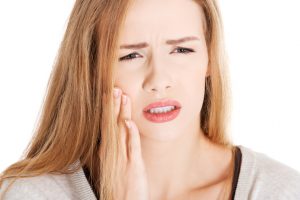 Bruxism is a fairly common condition that results when you grind and clench your teeth during the day or while sleeping. Although it may not seem like a really big deal, the condition can result in damage to your teeth and uncomfortable symptoms when left untreated. However, many are not aware they are grinding their teeth because it often occurs at night or it’s done unconsciously. As a result, you may start to have tooth sensitivity and other discomforts. There are many signs and symptoms that indicate the condition is present. As your dentist in Burlington MA, we have everything you need to know about the signs and symptoms of bruxism and what you can do about it.
Bruxism is a fairly common condition that results when you grind and clench your teeth during the day or while sleeping. Although it may not seem like a really big deal, the condition can result in damage to your teeth and uncomfortable symptoms when left untreated. However, many are not aware they are grinding their teeth because it often occurs at night or it’s done unconsciously. As a result, you may start to have tooth sensitivity and other discomforts. There are many signs and symptoms that indicate the condition is present. As your dentist in Burlington MA, we have everything you need to know about the signs and symptoms of bruxism and what you can do about it.
Signs and Symptoms of Bruxism
Most people who have bruxism aren’t aware they have the condition until after it has produced some complications. In some cases, the grinding and clenching isn’t brought to a person’s attention until after their spouse or family member has noticed the loud grinding at night. However, other signs of the condition often include damaged and worn teeth. Often, the teeth will become flattened, fractured or chipped. Overtime, the grinding may even cause the teeth to become loose.
The grinding causes tooth enamel to be worn away. As a result, the inner layers of the tooth become exposed, leading to tooth sensitivity and pain. The stress placed on the teeth and jaw can cause the jaw and face to become painful. Often, the jaw muscles may feel tired or tight. The pain can radiate the ears, making it appear as though you have a problem with the ear. It’s not uncommon for those with the condition to have headaches, especially near the temple.
The grinding and clenching can cause irritation to the inside of your cheek or even the tongue. If you begin to notice any signs of the condition or suspect you may be clenching your teeth, you need to call your dentist for treatment.
Treatment for Bruxism
Mild cases of bruxism may not require treatment, but for those who are experiencing the discomforts and tooth damage from the condition, your dentist will need to intervene. The most common type of treatment involves the use of mouthguards or splints from your dentist. The oral appliances are custom-made to keep the teeth separated. This will reduce the strain and stress on the teeth to prevent damage while allowing the discomfort of the condition to subside.
In some case, dental correction may be needed from your dentist in Burlington MA. If alignment issues are the cause, correcting alignment of the teeth will help to reduce the complications. Other treatments may involve therapies, braces, or even oral surgery.
Your Dentist in Burlington MA
Complete Dental Care provides diagnosis and treatments for bruxism. We will evaluate your individual case to provide the customized treatment you need to protect your smile. We’ll work to provide the treatment that best meets your needs and your lifestyle to reduce the discomfort while protecting your teeth from damage.







